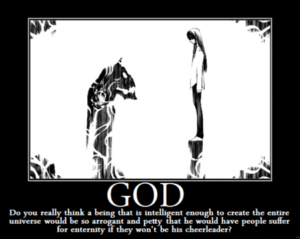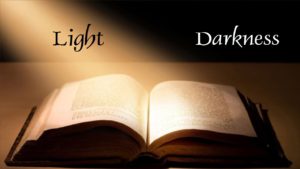
Theodicy Always Finds God Guilty
Blaming Him for the Evil of Man’s Sin
In Star Trek’s, The Cage, the alien with significant illusionary powers tells Captain Pike, “…wrong thinking will be punished; right thinking will be as quickly rewarded…{paraphrase}” Notice that in science fiction aliens become a substitute for God, gods or demons while noble mankind via science, knowledge, overcomes the superstitions of ancient civilizations? Is this true or is this propaganda designed to keep you from right thinking?

Is God the Tyrant of Heaven?
Eager to Punish All Who Reject Him?
Robert G. Ingersoll (1833-1899), was called, The Great Agnostic. A veteran of Lincoln’s War, his experiences led him to label religions as superstitions needing to be replaced by science and reason. He defined agnosticism as not just admitting that he did not know God but that you, me, cannot know God. He believed, “Every sect is a certificate that God has not plainly revealed his will to man…All these religions are inconsistent with intellectual liberty. They are the enemies of thought, of investigation, of mental honesty. They destroy the manliness of man. They promise eternal rewards for belief, for credulity, for what they call faith. This is not only absurd, but it is immoral.” He based his beliefs upon the perversion of Christianity in history. Christendom is the distortion of God’s grace into the tyranny of legalism in order to establish one’s systematic belief system over others. This concentration of attention on sinful men’s twisting of God’s grace is then conflated with God rather than viewed as separate from God. It becomes a Straw Man logical fallacy used to reject the Bible, turning the graciousness of God into the tyranny which is naturally the province of sin and Satan (Jo 8:44).
The number two in the Bible is used to compare or contrast to illustrate concepts that cannot be succinctly defined; for instance, light and dark. These two contrasting elements run throughout Scripture from Genesis to Revelation. “In the beginning…darkness…and there was Light” (Ge 1:1-3). Christ taught that if your eye were single, focused on God then you would be full of His Light; but, if your eye were evil, concentrated on sin, then your light would be dark light; not darkness which is the absent of light but the energy of sin seeking to overcome God’s Light, glory (Mt 6:22-23). Finally, in the new heaven and earth, all the saved would live in the Light of God’s glory in Christ; no sun, moon or stars would be necessary (Re 21:1-3, 22-27). However, those who rejected Christ would live in outer darkness as Seraphim continually searched them for any speck of Christ’s grace to release them; but, they wanted nothing to do with Christ and thus spend eternity without Him (Mt 8:10-12; Re 21:8).
Paul uses this dichotomy of two explaining how people do and should think. Think {φρονέω phroneō} means to be changed or conformed to that which has your attention (1Pe 1:14-16). This applies to everyone. Paul gives two types of thinking that are opposites; wrong thinking, fundamentally prideful {ὑπερφρονέω hyperphroneō}, and right thinking, humility {σωφρονέω}. Lost people fundamentally reject God and His truth including His Word (Ro 1:18-25); this is the ungodliness {ἀσέβεια asebeia} at the heart of one’s sin nature which all receive at conception (Ps 51:5; Ro 3:23). When did sin begin and is there a change in thinking?
Adam, Hebrew man, was made in the nature of God but in the flesh though without sin and walked with God (Ge 1:26-27; 2:7). When God made woman from man and brought her to Adam, he gives one of the finest examples of right thinking possible for a fleshly person (Ge 2:21-24). Notice the acceptance, the unity, the love that flowed not from the flesh but from unity with God as the foundation for their relationship. However, the flesh was soon not content and agitated for hidden knowledge (1Co 1:29).

God does not restrict Knowledge
He warns of Knowledge apart from Him
God gave man dominion over everything except one little tree which He called the Tree of Knowledge and warned Adam that if he ate of this tree, he would die (Ge 2:16-17). God clearly warns that if man chose to disobey the consequences would be severe – death! Was God being a tyrant? The tree had no inherent capacity to impart knowledge; that was never the issue! The flesh will not long submit to God and the implication is that Adam secretly longs for knowledge that he believes God has not given (Ro 8:5-8). By giving this command, God was bringing to the fore Adam’s inner thoughts (Ro 7:7-9). Adam shared his thoughts with woman and Satan used this growing disunity, resentment with God, to provide man the means to obtain this hidden knowledge (Ge 3:1-7). Woman was deceived and ate while Adam knowingly disobeyed God to obtain this knowledge (1Ti 2:14). When God came for man, though man hid from God, Adam immediately blamed God for giving him the woman that caused him to sin (Ge 3:8-12). Adam’s quest for knowledge apart from God broke his unity with God and then with woman. Wanting to be gods, the sin of Satan to be god (Is 14:14-17), man and woman chose not to pray to God for knowledge or for help during this temptation; i.e., they wanted this knowledge apart from God. This prideful wrong thinking mentality chose death over life (Ez 28:12-19). From this choice to follow one’s own reasoning over the reasoning of God flowed the violence and degradation that has plagued man ever since.
Churches are no different than the people they contain. The churches of Smyrna and Philadelphia were humble and weak by the world’s standards but were strong in Christ’s grace (Re 2:8-11; 3:7-13). However, the church of Ephesus, like Adam, had left its first love, Christ, to follow self; i.e., begin the long walk into the darkness of sin and pride of life (1Jo 2:15-17; Re 2:1-7). The end point of chasing knowledge apart from God is the Laodicean church (Re 3:14-22). Just as Satan deceived woman who was wrongly taught by Adam, this church believed they were rich, wise and strong; in fact, before Christ they were poor, weak and blind! Churches make the transition from Light to Darkness and no longer be Christ’s churches (Re 2:5-6).

God’s Knowledge, Light, Pierces Darkness
Man’s Knowledge, Darkness, Suppresses Light
Is God the Tyrant? Religions, all based on works, demands adherents to prove themselves worthy by keeping its rules and suppressing those who fail. This is the wrong thinking of pride; i.e., sin. This always results in degradation and violence. God sent His Son in the form of sinful flesh, though without sin, to die for sin in our place redeeming us from our sin (Ro 5:6-8; 2Co 5:21). The resulting new nature (2Co 5:17) exhibits the same character as Christ; i.e., humility as exemplified in the Beatitudes (Mt 5:2-12). However, just as Cain, the prideful one rejected by God, killed Abel, the humble one accepted by God; so also will those who walk in their own knowledge seek to suppress and remove those who are in the process of being matured in the humble nature of Christ (Ge 4:3-8).
The true tyrants are the agnostics, the atheists, the religionists of all flavors and denominations who believe in the delusion of their own knowledge apart from God and thus embrace their own eternal separation from Christ for eternity (2Th 2:9-12; 1Pe 4:4-6, 12-14). God does not tyrannize them but allows them to go their way until the time of judgement (Ro 1:22-25; He 9:27-28); how is that tyranny? The terrible tragedy is their search for hidden knowledge apart from God will result in an eternity hidden from God in a stark reality beyond their wildest nightmares. God has no pleasure in the death of the wicked though they take pleasure in the death of the righteous (Pr 1:20-33; Ez 33:11). Who are the real tyrants?
